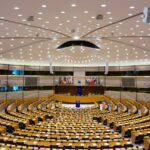Today, the United Nations marks the International Day of Commemoration for the Victims of the Crime of Genocide. The designation of genocide as an independent crime under international law – alongside war crimes and crimes against humanity – was in reaction to the horrors of the second world war, when Nazi Germany, driven by ideas of “Aryan superiority” and a desire for “racial purity”, pursued an extermination campaign against several peoples they deemed inferior.
Roma and Sinti, Slavs and, most extensively, Jewish people, were brutally persecuted. Millions died in concentration camps – starved, worked or gassed to death – alongside political opponents such as communists, trade unionists and socialists.
This unprecedented brutality, along with the enormous human and material cost of the second world war, was the motivation behind the push to create the United Nations and a global rules-based system to render war a last resort.
That order would set firm boundaries for behaviour in war, for military occupations, in regulating state-to-state behaviour and preventing egregious crimes – even within states – such as genocide, systematic murder, forcible population transfer, enslavement, apartheid and many others.
It was a postwar dream of a better world, where human rights principles would be universally applied and a true global community of nations, equal in rights, could emerge and flourish under the protection of a shared law that would make war obsolete. Today, it is that dream that looks obsolete.
Today, as the world watches Israel’s mass murder in Gaza, the wholesale destruction of entire areas, town and cities, the mass displacement of nearly 2 million people, the global rules-based order has never looked more impotent or imperilled.
In less than two months, the Israeli bombardment of Gaza has, according to Save the Children, killed more children than the number of children killed in global conflict zones every year since 2019; more UN workers than in any similar period in the UN’s 78-year history, and more journalists than in any period of conflict since 1992. The collective punishment of Palestinians is incomparable to any other conflict in recent memory.
And these last two months are merely a continuation of a 106-year history characterised by the denial of rights to the Palestinian nation that began in 1917 with the Balfour declaration and British colonial rule, and continued with the forced expulsion of more than two-thirds of the Palestinian people in the 1948 Nakba, and the occupation by Israel in 1967 of the rest of historical Palestine.
There was a glimmer of hope in 1993, when the Palestine Liberation Organisation and Israel signed the Oslo accords. With international backing for a two-state outcome on 1967 borders, for the briefest of moments it seemed that maybe resolution could finally be found, and Palestinians could enjoy freedom in a state of their own.
But negotiations were poorly framed, pushing back talks on “final status” issues in favour of interim agreements and “confidence building” measures.
It was another kind of building, settlement building, that finally put paid to Oslo. Israel never accepted a wholesale withdrawal to 1967 boundaries, not least because of a settlement project started in the 1970s with the explicit aim of keeping control over land and people. Diplomacy hit a wall, literally, and the world lost interest.
Unable or unwilling to pressure Israel, the world acquiesced with prime minister Benjamin Netanyahu’s turn away from a two-state outcome in favour of continued, indefinite management of military occupation – an apartheid system of rule – and continued settlement expansion.
Even as Netanyahu flanked himself with Jewish supremacists devoted to an expansionist, militarised Israel, the world was unperturbed. And the political horizon for the Palestinian people vanished.
Nevertheless, the PLO persists with its focus on diplomacy. It is still possible to salvage a two-state outcome. We can learn from past mistakes. We can, from the beginning, set down an unambiguous end to occupation as the end goal, starting with the immediate recognition of the state of Palestine on 1967 borders and a commitment to the right of return of Palestinian refugees. Negotiations can then focus on implementation.
The entire world outside Israel claims to support a two-state outcome. But it will take the kind of commitment, determination and political will that has been sorely lacking over Palestine.
World powers need to start taking seriously their responsibilities and duties under the international system, primarily the duty to implement international law and resolutions fairly, equally and with accountability. Settlements are war crimes. They must be treated as such. Israel’s apartheid rule over an occupied population is a crime against humanity. It must be treated as such.
Israel is not engaged in a “war” on Hamas. It is engaged in a war on the Palestinian people. This is amply evidenced by its indiscriminate bombing of Gaza, the genocidal language deployed by Israeli leaders from the very top, and the ethnic cleansing we hear promised and see implemented.
This must end. Now. There is much at stake, not least that postwar dream. The Convention on the Prevention and Punishment of the Crime of Genocide was adopted in 1948, the same year as the Nakba. It was adopted in the spirit of “never again”.
Source: The Guardian
















